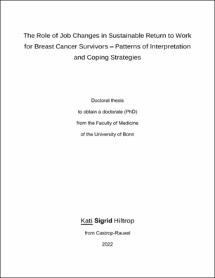The Role of Job Changes in Sustainable Return to Work for Breast Cancer Survivors – Patterns of Interpretation and Coping Strategies

The Role of Job Changes in Sustainable Return to Work for Breast Cancer Survivors – Patterns of Interpretation and Coping Strategies

| dc.contributor.advisor | Ernstmann, Nicole | |
| dc.contributor.author | Hiltrop, Kati Sigrid | |
| dc.date.accessioned | 2022-01-06T11:42:06Z | |
| dc.date.available | 2022-01-06T11:42:06Z | |
| dc.date.issued | 06.01.2022 | |
| dc.identifier.uri | https://hdl.handle.net/20.500.11811/9529 | |
| dc.description.abstract | Thus far, research on return to work (RTW) after breast cancer has focused on objective outcomes such as return rates. Moreover, a strong emphasis on the initial RTW can be observed in the literature. However, knowledge on the evolution of work participation over time in the aftermath of RTW, which can be referred to as the sustainability of RTW, is scarce. The aim of this doctoral thesis was to investigate breast cancer survivors’ perspective on job changes as an indicator of the sustainability of RTW using Parsons’ concept of the sick role and the conceptual model of the experience of cancer and work as a theoretical basis. The following research questions were addressed: How do breast cancer survivors experience their RTW and the phase afterward? How do breast cancer survivors experience and evaluate job changes after their RTW? How and why do job changes occur in breast cancer survivors after their RTW? This cumulative dissertation comprises five publications. (1) The first original article focuses on the experiences of 14 male breast cancer patients through their RTW and its aftermath using data from the N–MALE project (Male breast cancer: patients' needs in prevention, diagnosis, treatment, rehabilitation, and follow-up care). (2) The letter to the editor answers questions regarding the first original article and discusses further research needs related to RTW and male breast cancer. (3) The study protocol describes the methodological approach of the mixed methods B–CARE project (Breast cancer patients’ return to work), which aimed to investigate the rehabilitation and RTW of breast cancer survivors 5–6 years post-diagnosis. (4) The second original article employs regression analyses with B–CARE survey data from 184 breast cancer survivors to investigate the involuntariness of job changes and their association with occupational development satisfaction. (5) A qualitative grounded theory approach based on the interview data of the B–CARE study with 26 female breast cancer survivors was applied in this original article to explore rehabilitation processes of long-term breast cancer survivors. Overall, the findings show that breast cancer survivors were naturally motivated to return to work. Experiences were primarily positive, although male survivors reported stigmatization in the work context. Job changes after the return were welcomed, although financially disadvantageous (e.g., early retirement). It was found that the involuntariness of job changes is negatively associated with occupational development satisfaction. The grounded theory of incompatibilities in the areas of life, newly developed in this dissertation, explains that (involuntary) job changes may occur due to interviewees’ struggles to balance the demands of different areas of life (family, work, household, leisure time, and disease). As a consequence, prioritization of single areas, particularly areas other than work, occurred. These findings add new aspects to the conceptual model of the experience of cancer and work and support it by identifying the rehabilitation process after breast cancer as a continuous, non-linear process that can continue 5–6 years after diagnosis. In contrast to Parsons’ concept of health, the breast cancer survivors apparently had not yet regained their “optimum capacity” to perform their daily roles. The results indicate the existence of support needs in long-term cancer survivors in order to prevent job changes that pose a risk to the sustainability of RTW. | en |
| dc.language.iso | eng | |
| dc.rights | In Copyright | |
| dc.rights.uri | http://rightsstatements.org/vocab/InC/1.0/ | |
| dc.subject | Medizinische Soziologie | |
| dc.subject | Versorgungsforschung | |
| dc.subject | Onkologie | |
| dc.subject | berufliche Wiedereingliederung | |
| dc.subject | Rehabilitation | |
| dc.subject | Medical Sociology | |
| dc.subject | Health Services Research | |
| dc.subject | Oncology | |
| dc.subject | Return to work (RTW) | |
| dc.subject | Rehabilitation | |
| dc.subject.ddc | 300 Sozialwissenschaften, Soziologie, Anthropologie | |
| dc.subject.ddc | 610 Medizin, Gesundheit | |
| dc.title | The Role of Job Changes in Sustainable Return to Work for Breast Cancer Survivors – Patterns of Interpretation and Coping Strategies | |
| dc.type | Dissertation oder Habilitation | |
| dc.publisher.name | Universitäts- und Landesbibliothek Bonn | |
| dc.publisher.location | Bonn | |
| dc.rights.accessRights | openAccess | |
| dc.identifier.urn | https://nbn-resolving.org/urn:nbn:de:hbz:5-64958 | |
| dc.relation.doi | https://doi.org/10.1111/ecc.13402 | |
| dc.relation.doi | https://doi.org/10.1111/ecc.13471 | |
| dc.relation.doi | https://doi.org/10.1136/bmjopen-2019-033533 | |
| dc.relation.doi | https://doi.org/10.1007/s11764-021-01035-5 | |
| dc.relation.doi | https://doi.org/10.1002/pon.5769 | |
| ulbbn.pubtype | Erstveröffentlichung | |
| ulbbnediss.affiliation.name | Rheinische Friedrich-Wilhelms-Universität Bonn | |
| ulbbnediss.affiliation.location | Bonn | |
| ulbbnediss.thesis.level | Dissertation | |
| ulbbnediss.dissID | 6495 | |
| ulbbnediss.date.accepted | 16.12.2021 | |
| ulbbnediss.institute | Medizinische Fakultät / Kliniken : Forschungsstelle für Gesundheitskommunikation und Versorgungsforschung | |
| ulbbnediss.fakultaet | Medizinische Fakultät | |
| dc.contributor.coReferee | Holmberg, Christine | |
| ulbbnediss.contributor.orcid | https://orcid.org/0000-0002-8357-0855 | |
| ulbbnediss.contributor.gnd | 1252097417 |
Files in this item
This item appears in the following Collection(s)
-
E-Dissertationen (2103)




